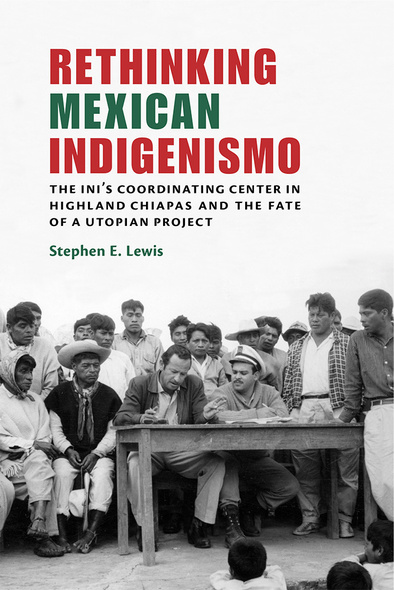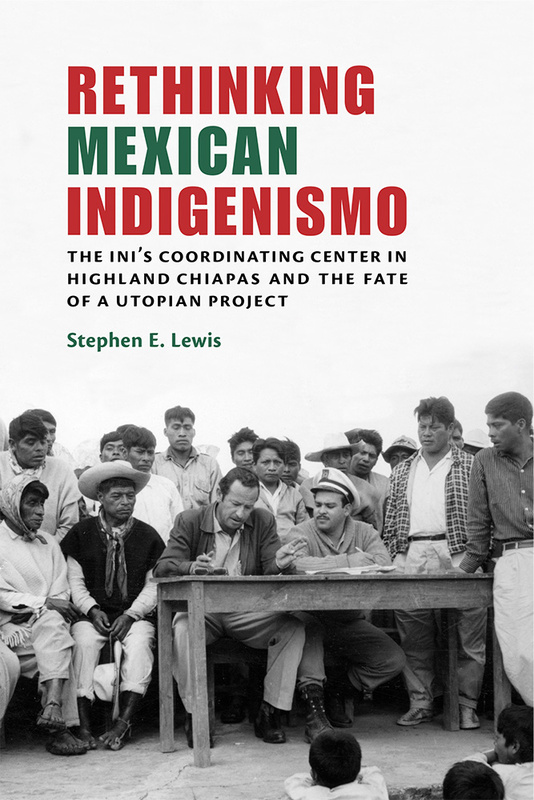
Rethinking Mexican Indigenismo
The INI’s Coordinating Center in Highland Chiapas and the Fate of a Utopian Project
Honorable Mention for the 2019 Thomas McGann Book Prize from the Rocky Mountain Council for Latin American Studies
Mexico's National Indigenist Institute (INI) was at the vanguard of hemispheric indigenismo from 1951 through the mid-1970s, thanks to the innovative development projects that were first introduced at its pilot Tseltal-Tsotsil Coordinating Center in highland Chiapas. This book traces how indigenista innovation gave way to stagnation as local opposition, shifting national priorities, and waning financial support took their toll. After 1970 indigenismo may have served the populist aims of President Luis Echeverría, but Mexican anthropologists, indigenistas, and indigenous people themselves increasingly challenged INI theory and practice and rendered them obsolete.
[Lewis's] approach, grounded in painstaking archival work and the author's deep knowledge of the region, yields a superb analysis of the fraught relationship among revolutionary indigenism, Mexican anthropology, and Tzeltal and Tzotzil communities.'--Ben Fallaw, American Historical Review
The book is fun to read, in part because Lewis has a great eye for surprising stories. . . . Rethinking Mexican Indigenismo is a comprehensive and nuanced investigation of an organization that looms large in the history of twentieth-century Mexico.'--H-LatAm
Overall, Lewis has provided a rich, exhaustive account of indigenismo from the 1940s through the 1970s that will become required reading for anyone trying to understand Mexican rural politics during this time period.'--Hispanic American Historical Review
A welcomed addition to the growing scholarship that attempts to make sense of Mexico's rapid decline as a continental leader on indigenous policies.'--IK: Other Ways of Knowing
Rethinking Mexican Indigenismo is one of but a few archive-based studies--and the first in English to focus on Chiapas--that treats indigenismo as a historical subject. Overall, Lewis's book is a fascinating portrait of how, in the author's words, 'an indigenista project that initially contemplated major structural reforms [. . .] ended up a widely criticized, largely ineffective bureaucracy that lost the support of the very people it purported to serve.''--Tribal College Journal of American Indian Higher Education
Well written and clearly argued, this book analyzes the outcomes of a generation of government policy vis-à-vis indigenous peoples in Chiapas. . . . It is a superior contribution to the field in part because of its scope and in part because of its detail.'--Alexander S. Dawson, author of Indian and Nation in Revolutionary Mexico
Steve Lewis expertly provides us with a magnificent tour-de-force of indigenista policy initiatives designed to improve the life of the Maya in Chiapas, Mexico's most backward state. This book is required reading to understand the potential and contradictions of government-centered development programs, as well as the personalities of those who design such policies.'--Marc Becker, author of Pachakutik: Indigenous Movements and Electoral Politics in Ecuador
Stephen E. Lewis is a professor of history at California State University, Chico. He is the author of The Ambivalent Revolution: Forging State and Nation in Chiapas, 1910-1945 and the coeditor of The Eagle and the Virgin: Nation and Cultural Revolution in Mexico, 1920-1940.
List of Illustrations
Acknowledgments
Introduction
Part One. The Utopian Project
Chapter One. Dramatis Personae: The Indigenous, Ladinos, and Indigenistas
Chapter Two. Negotiating Indigenismo: The Bilingual Cultural Promoter
Chapter Three. Utopian Dreams and the Mística Indigenista
Part Two. Sober Realities
Chapter Four. Winning the Battle, Losing the War: The INI versus the Pedrero Alcohol Monopoly
Chapter Five. Take Two: The INI Charts a More Modest Course
Chapter Six. Modernizing Message, Mystical Messenger: The Many Uses of the Teatro Petul
Chapter Seven. Medical Pluralism and the Limits of INI Health Programs
Chapter Eight. From Innovation to Administration: The Coordinating Center's Very Long Decade, 1958-1970
Chapter Nine. Did the INI Promote Caciquismo?
Part Three. Crisis, Rekindled Populism, and the Fate of Mexican Indigenismo
Chapter Ten. The Generation of 1968, the Critique of Mexican Anthropology, and the INI's Response
Chapter Eleven. Indigenismo and the Populist Resurgence (1970-1976)
Conclusion
Notes
References
Index




